- Home
- Anne Rivers Siddons
Colony Page 6
Colony Read online
Page 6
“Lord, no,” I said. “My mother’s family never gave us any of theirs either, not really. How could I miss what I never had? Let’s just make our own, enough for the two of us, and tell the rest of the world to take a hike. Crawl into bed and pull the covers up over us, and never come out.”
He smiled at me, and the sweet, thick warmth in the pit of my stomach that stayed there most of the time began its slow coil up inside me once more. Sometimes I could scarcely breathe with the knowledge that for the rest of my life, whenever we wanted, Peter and I could lie down wherever we wished and do to each other the things that we did in the cool nights and pale dawns of Northpoint, New Hampshire. Who, I thought, reaching up to touch his face, cared about money when they could have that?
Peter put his hands on my breasts and pushed me back down onto the old blanket we had brought with us.
“You’re going to have a hard time realizing we don’t do this in Retreat,” he said, putting his hands under my clothes. He ran the fingertips of one down my stomach, along the line of dark hair that grew there, and into the dark warmth below it.
I rolled over to face him, opening my legs.
“You’re kidding,” I breathed into his neck. It was hot, scalding.
“Oh, no,” he said, easing over onto me. His hardness pressed against my thighs and then slipped down between them. “Nobody fucks in Retreat. Reproduction is accomplished by cell division, like amoebas. You’d be thrown out of the colony if they even suspected you did this.”
He thrust, and thrust again. I felt the heat start up, up.
“Well, you shouldn’t have corrupted me then,” I gasped, arching up to meet him. “I can’t just stop doing this…now…oh!”
“Or this?”
“No….”
“Or this? Oh, God, Maude….”
“Hurry, Peter, hurry….”
“You’ll have to give it up because the houses are so close together that you can hear…oh, Jesus, Maude…everything.”
“Then,” I said fiercely, riding with him up that long red crest, seeing lights explode behind my closed eyelids, “you’ll just have to stuff a pillow in my mouth every time because I’m very surely going to scream—”
And did. And heard his whoop of laughter spill out with his climax.
I never tired of it, that long slide into red darkness, that shuddering up-spiral, that joyous outspilling. I would ride with him into hell on that, I thought. Bed and laughter, those two things, with Peter, would last forever, withstand anything. And despite what he said, we could do those things anywhere, including Retreat. Who would dare to stop us?
No matter that I came to feel the cold of Hannah Chambliss’s mind reach out for me as the miles between us shortened, we set off for Maine on a blue-edged morning not long after that evening in an envelope of sensuality and laughter.
Retreat lies at the tip of Cape Rosier, a wild green stub of land fingering out into Penobscot Bay farther than any other land mass on that coast. Only the great islands of the bay—Deer Isle, North Haven, Islesboro—are more sea-locked and inaccessible. The seas around the cape, unbroken for many miles in their sweep up the Penobscot, are dark blue and empty for hours and sometimes days at a time of sail traffic, all but the enormous oceangoing sail yachts preferring the island-sheltered harbors around Rosier. There are many, teeming with sails and yacht clubs and summer homes and colonies: Bucks Harbor, at South Brooksville; Orcutt; Center Harbor, at Haven, near Brooklin; and the entire archipelago of small sheltered harbors around the tip of Naskeag Point into Blue Hill Bay and beyond into the great blue of Frenchman’s Bay. Here the truly wealthy have for a hundred summers nestled their enclaves like small succulent piglets nosing at the pure-cream teats of Bar Harbor and Mount Desert.
Over on that side of the long peninsula that juts out from Blue Hill down to Naskeag, the water is acknowledged to be warmer and gentler, the houses far grander and more accessible, the air sweeter and milder, and the blood far bluer. Cape Rosier is a wild place for mavericks, the conventional summer-people wisdom goes, for those who prefer their own society and don’t mind the great seas and booming blue winds and howling storms; who don’t care that the nearest good shopping town is elegant old Castine, some twenty miles away over horrendous roads (though, if you could go by water, it would be nearer five). The very small village of South Brooksville provides a general store and rental library and cemetery and infinitesimal post office; it is typical of Retreaters that they are proud that the post office was, until the early 1960s, the smallest in the United States. Surrounding farms provide produce, eggs, and milk; fishing boats bring in lobsters and haddock; tidal flats yield clams. A trip to Blue Hill or Ellsworth, for serious shopping and culture, is a half-day prospect, and a sojourn to Bar Harbor can still take the whole of a day, well into darkness. I once offered the suggestion to Mother Hannah that one saw the same faces year after year in Retreat because nobody else wanted to bother with it.
“I know we’re supposed to be very careful who we let into Retreat,” I said, “and I’ve heard for years how hard it is for outsiders to be accepted here. But for my money, it’s because nobody but us could ever find the place, much less want to go to all the trouble of getting to it and actually living in it.”
I was, by then, finally able to tease Mother Hannah a little; I say finally, because it took me years to dare to do it. Mother Hannah never did come to invite it. But she seldom realized she was being teased, either, so I was fairly safe the few times I did.
“Nonsense,” she said serenely, bothered not at all by any opinion I might have. “There are many people who would move heaven and earth to be a part of Retreat. But they’re rarely suitable, and they wouldn’t be happy here anyway. We’re very plain-living people, you know, when we’re up here. And often quite high-minded; most people are far happier in Northeast Harbor or at Bass Cove or Somes Sound. Places like that. Even Bar Harbor.”
Her high-arched nose told me what she thought of those sinks of depravity and excess.
Peter, who was lying stretched full-length before the fire eating apples while one of our frequent June nor’easters moaned outside, said from the depths of an old Hudson Bay blanket, “ ‘The soul selects her own society and shuts the door. On her divine majority, obtrude no more.’ ”
“Exactly,” Mother Hannah said. “That’s very cleverly put, darling.”
“Emily Dickinson thought so,” Peter’s voice, suspiciously equable, said from the couch.
“Is she that strange little woman with the bicycle visiting Frances and English Sears?” Mother Hannah said vaguely.
“I doubt it,” Peter said, laughter breaking through. “From what I hear, she never left her own back yard in her entire life.”
“Really, darling, you know the strangest people.”
“Don’t I just,” said Peter.
For whatever reason, mainly geographical ones, Cape Rosier and Retreat remain nearly as untouched today as they did on that long-ago day I first came here, and in a way it is a great pity, for this coast and the countryside around it are by far the most beautiful I have ever seen. But at first it frightened me. Stark, jutting, thickly forested with the graceful pointed firs whose silhouettes against the sky can break the heart, gray-spined where the great rock ribs of the earth break through, and bound at the sea’s edge by huge pink boulders and fierce red ledges left by the last dying glaciers, the cape seems, at first, inimicable to man, inhospitable to life. The great blue skies and endless indigo seas—edged in a kind of crystal light when the weather is about to change for the worse, losing themselves altogether in the thick, silent, white sea fogs that sometimes roll in for weeks—seem to me to be deeper, purer, harder, vaster than anywhere else on that old coast. On the wind you can hear the cries of gulls all the way out on the big islands, or the fog buoy miles and miles away off Stonington on Deer Isle. On the days of high sun and still blue air, you can see the line of the Camden Hills across the entire great bay. Sight, sound, smells all
have a preternatural keenness here.
It seems to me—and I remember it was perhaps the first thought I had when at last we jolted out of the forest and saw Retreat lying ahead of us in the sunset, at the end of that endless day—that Cape Rosier is about clarity. Simply that. There is nothing here shifting, seeping, insidious, seductive, smothering, soft, to blur the edges of anything. The sharp beauty cuts like a knife. Even the small rich green sweeps of the little sea meadows, thick with wildflowers and rimmed with the black-green of the firs; even the undulating fringes of goldenrod and Queen Anne’s lace along the dusty roadsides; even the riots of short-lived summer flowers in the yards of the most humble shacks—even these seem as sharply and clearly limned as the details of a Dali painting. To my senses, long lulled by the velvety morass that is the Low Country, it looked that day a country of a million sharp and dangerous and beautiful sword points.
“I never saw anything so beautiful,” I said to Peter finally, when it was obvious that he was waiting for me to tell him what I thought of this place he so loved. “And it looks like it could easily kill you. Peter, it’s all so…sharp.”
He looked at me and smiled. “I know what you mean. But it’s just what you’ll come to love about it. It’s…all open to you. It keeps nothing back. It shows you its teeth and spine and breath, and in the end something in you rises up to meet and match it. It never coddles you, but in the end it gets the best out of you. And it gives you its best. It clears away a lot of unnecessary stuff, this coast, this place. I guess what I mean is that it’s possible to learn about absolutes here. You’ve never had that in Charleston.”
I started to protest and then did not. He was right. That sinuous southern life, that oblique and slow and complicated old beauty, that warm thick air and blood-warm sea, that place of mists and languor and fragrant richness—it could soothe you and charm you and teach you much, but it could not cleanse and clarify. This place could. Perhaps that was what I feared most: that Cape Rosier and Retreat would ask of me a sea change that I somehow could not afford, or would fail to make.
“I don’t think I’ll leave this place the same person as I came here,” I said obscurely, and he grinned wider and ruffled my hair and told me I was ridiculous, that I would be me, only more so, in Retreat.
All these years later, I still do not know who was right.
From the pitted county blacktop a sandy lane led off into the fir and birch groves that ran straight down to the sea, and there was an old gray wooden oar fastened to a post there that said, in letters faded nearly to invisibility, RETREAT COLONY, COVE HARBOR YACHT CLUB. The road was absolutely still and quiet, and the crystal-blue air was chilling as we sat there in the open car. I drew my sweater around me, shivering with more than cold. We might have been looking down into the dawn of time; no roofline or chimney or smoke rise broke the serrated line of the firs. No human voice cut the silence. Only the mewling cry of the gulls and, far away, a little hushing sussuration that I found later to be the gentle wash of the tide on the shingle beach.
“Well, let’s do it,” Peter said, and put the car into gear. I could not muster enough breath to reply. I was, at that moment, absolutely terrified.
Retreat has, instead of streets, a web of narrow, wildflower-fringed sandy lanes that wander through the dark woods, all of them leading one way or another to the water. The old houses are mostly gray-or brown-weathered cedar shingle, so that in the twilight all you can see of them at first is the flash of white trim and the blazing window boxes. Then your eyes adjust to the green darkness and you can pick them out, set back in that primeval forest from the lanes, bulking high against the lucent sky: tall and rambling, winged and elled old dowagers with many windows and porches, shouldering in among the great gray rocks that lie slumped like elephants on that rich black earth. All have views of the bay or the harbor, and the ones at the ends of the lanes have magnificent wraparound vistas; I often, in those early years, envied the families who had that largesse as a part of their lives whenever they chose to look at it. Liberty, our cottage, looked out to sea only over the shoulders of Braebonnie, the Potters’ newer and larger cottage, which had been built on the very cliff overlooking the shingle beach. You could see the sea, but you did not have that wild, all-pervasive sense of it that Braebonnie and many other Retreat cottages offered.
“It’s because Liberty is one of the three original cottages here,” Mother Hannah told me that first summer. “In those days you could only come here by packet from Rockland, and it docked down at the foot of our lane. Peter’s dear grandfather was thinking of his family’s comfort when he built here. It was only a short journey up from the dock, you see. Easier on the servants too. Of course, no one in that original little group of settlers ever expected people to actually buy up the land between them and the water and build more…imposing homes. There was a sort of gentlemen’s agreement among the originals. But of course Braebonnie was built much later by, I believe, some people from Connecticut. We didn’t know them; they didn’t care for Retreat after all and sold almost immediately to the Potters. I must say I’ve always been relieved to have them so close by; fellow Bostonians, you know. Even if the house is…a bit excessive for a simple summer colony.”
Braebonnie was indeed large—it had perhaps twenty rooms—but it sprawled down the cliff in a weathered, mossy pile of shingle and stone so sweetly and unassumingly that it did not seem to me the least imposing. I loved it. I always have, ever since that first summer. So many of my happiest memories of Retreat were born in Braebonnie, when Amy and I were young together. I love Liberty too, of course; it is all I have of youth and Peter, and it is unquestionably home to me. But it is so somehow like Mother Hannah—square, upright, uncompromising—that I often fancy I can see her in the cedar-dark old rooms, straight-spined and austere and moving with her silent, sweeping tread, or hear her voice in the emptiness. As I said, sound is queer here by the water.
“Get out of here. This is my house now,” I have said to that disapproving shade more than once. And to exorcise her I have cut her lilacs down to size, and added a long sun porch that commands the sea, and enlarged all the back windows and added many, so that the sound of the water is the last thing one hears at night, and the dancing stipple of sea light on the ceiling is the first thing one’s opening eyes see in the morning. She would absolutely have hated all of it. Mother Hannah was always more annoyed than exalted by the sea.
After the ritual of welcome, which never varied until Mother Hannah’s death—the cool little kiss, the light embrace, the offered cheek smelling of talcum and smooth linen stored in cedar—she opened her arms to Peter and held them so until he came into them, and when she had him firm, she closed her eyes and rolled her cheek back and forth in the angle where his neck met his shoulder, smiling as rapturously as a nursing kitten. There were tears on her satiny cheek when she finally let him go and stepped back to look at him.
“You’re far too thin,” she said. “And you’ve lost your lovely tan. You shall have days and days in the sun simply vegetating, and Christina and I are going to feed you till you pop. If you’re this worn out now, what on earth will you be when you start your position?”
Mother Hannah could never bring herself to say, simply, “teaching.”
“I haven’t lost an ounce, Ma, and I’ve been sailing every day for the past week at Northpoint,” Peter said. “Winnepesaukee is right there. Stop fussing. Maude feeds me like a pig. She’s turning into a great cook.”
“I’m sure she is,” Mother Hannah said, smiling her little V smile at me. “These pretty southern girls are born knowing how to please a man, I expect.”
Both my neglect of her son and my overblown southern carnality hung in the air between my mother-in-law and me. I smiled brightly at her. She had forgiven Peter, I knew; the household appointments and the handsome roadster said as much. I also knew she had not forgiven me. The daughter-in-law she would present tonight to her world assembled at the dining hall was so patently n
ot the one she would have chosen that it must have seemed in her wintry eyes grotesque.
“I’m trying hard,” I said. “I never cooked at home, but taking care of Peter is number one now.”
“Yes,” she said.
Peter’s father kissed me, I thought, with genuine pleasure and picked up my bags.
“The back corner, darling, please,” Mother Hannah said, and Peter and his father looked at her.
“That room is an oven, Ma,” Peter said. “And it’s just got the one twin bed. I thought we’d have my old room.”
“I know, sweetie, but Micah found dry rot in some of the floorboards in your room this spring, and he wasn’t sure about the weight of two people.”
Her eyes measured me. I flushed.
“Besides,” she said, “it has much the prettiest view of the water. And I had Micah bring up the big bed.”
She dropped her eyes and I flushed again. Peter’s father vanished up a staircase of suicidal steepness and we followed him. I took a great deep breath, partly in relief at being out of her presence at last and partly of pure pleasure at the wonderful smell of old cedar holding the warmth of the day. The cottage has never been winterized, so that the exterior shingles of red cedar are also the interior walls, and the rafters and beams are of the same wood, and over the long years it has mellowed to a glorious, dark, fire-shot honey gold.
“The color,” Amy once said, “of the world’s most beautiful chestnut horse.”
Our room, at the end of the upstairs central hall, was indeed tiny. The huge white iron bed dominated it. It was turned back, so that thin, lovely old white linen sheets showed their cutwork, and it was piled with crisp-slipped goosedown pillows and comforters and a thick orange-and-black Princeton blanket. I smiled, at the great bed and the blanket and at Peter.

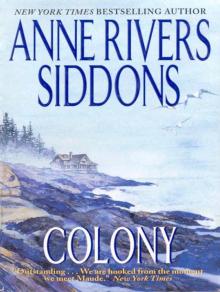 Colony
Colony Nora, Nora
Nora, Nora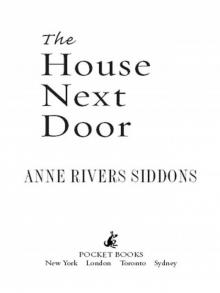 House Next Door
House Next Door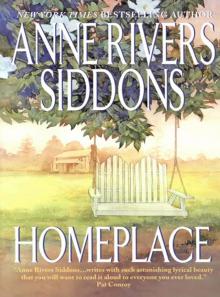 Homeplace
Homeplace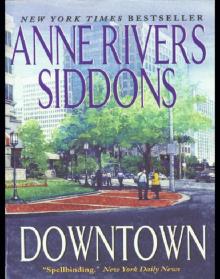 Downtown
Downtown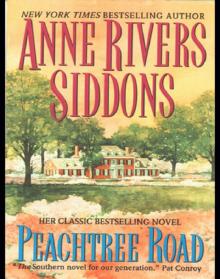 Peachtree Road
Peachtree Road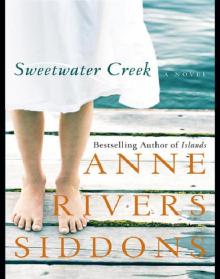 Sweetwater Creek
Sweetwater Creek Fault Lines
Fault Lines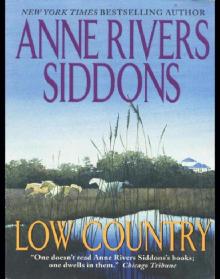 Low Country
Low Country The Girls of August
The Girls of August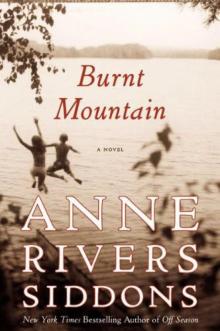 Burnt Mountain
Burnt Mountain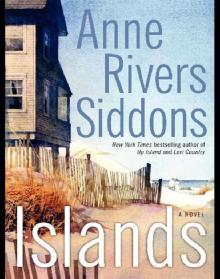 Islands
Islands